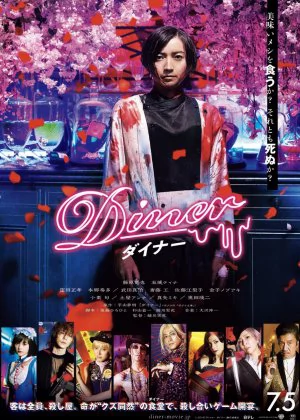Diner

Mika Ninagawa doesn't direct too many movies, after all she is a celebrated photographer first, niche director second. But whenever she assumes the director part, she is sure to make it count. 2019 was a pretty big year for her, with no less than two feature films and an episode of Followers on her slate. Diner [Dainâ] is one of those two films and as a big fan of her work I couldn't wait to catch up with it. It's a good thing then that the film didn't disappoint in the slightest, making me even more curious to see No Longer Human (her other 2019 project). But let's just focus on Diner first.
![screen capture of Diner [Dainâ]](/thumbs/img/articles/1200xauto/diner-1.webp)
Ninagawa's films are best known for their extremely colorful cinematography, richly detailed sets and cartoonesque worlds. In a way she makes perfect companion pieces to the films of Tetsuya Nakashima, though Diner probably reminded me even more of Katsuhito Ishii's Smuggler. I was a bit surprised to learn that Diner is based on a novel and not a manga (though there is a manga adaptation), then again the line between those worlds is probably a bit blurrier in Japan than it is over here. In any case, Diner is a dark, cartoony fantasy that is sure to please fans of the more creative, quirkier genre cinema.
This of course doesn't mean that Diner is simply a piece of fancy pulp cinema that is purely played for entertainment. The story centers around themes like loneliness, perseverance and trying to find your place in this world, it's just that the presentation isn't quite as dramatic or serious as you'd expect it to be. It's a duality fans of Japanese cinema (and popular culture in general) will already be familiar with, but if you're new to this kind of cinema it might cause some puzzlement. It's also one of the main reasons these films don't really travel too well, though often do manage to attract a cult following.
The story revolves around Kanako, a young girl with no clear goal in life. She has no friends, no real passion and nothing to live for. But a particularly colorful picture of Guanajuato kick-starts an adventure that quickly takes a dark turn. After getting caught stealing from a gang of criminals, Kanako ends up waitressing in a diner for contract killers. Her life hangs by a thread, but she turns out to be quite resourceful and after convincing her boss she has more talents than her innocent looks led on, she is hired on a permanent basis. Little does she know a Yakuza stand-off is about to take place in the diner.
![screen capture of Diner [Dainâ]](/thumbs/img/articles/1200xauto/diner-2.webp)
I'm a total sucker for pretty pictures and Ninagawa is one of the best in the business. Already renowned for her pop and fashion photography, she infuses that same aesthetic into her films. Every frame is extremely rich in detail and color, while the lighting plays a big part in the overall effect too. The camera work is bold and explicit, even characters are stylized to the extreme. The only reason why I still prefer Helter Skelter over this film is that the limited setting (most of the film is set in the diner) makes things a bit more predictable, especially during the second half of the film. That's really just nitpicking though, because Diner is strikingly beautiful.
The visual splendor may not have come as a surprise, the superb score surely did. It's not the first time Ninagawa tries to make a difference with the soundtrack, but this time around it actually adds something unique. The compositions themselves aren't that special, but there's an electronic additive that gives them a lot more punch and kick. There are at least four or five scenes where the music is as prominent as the visuals, which makes for an overwhelming sensory experience. A very pleasant surprise and an example for other directors out there.
The cast is very much on point too. I was happy to see Tina Tamashiro (Chiwawa and Chasuke's Journey) making good progress as the film's lead. Together with veteran Tatsuya Fujiwara she gives this film a slightly more human face, even though their characters remain over-the-top archetypes. There are also some secondary roles of note, with Shun Oguri, Shinji Takeda and Anna Tsuchiya delivering great performances that are bound to leave a lasting impression. While not a film that will win the actors any awards, it's nice to see them giving it their all.
![screen capture of Diner [Dainâ]](/thumbs/img/articles/1200xauto/diner-3.webp)
Regardless of underlying themes, Diner is full-on entertainment. This is quirky, over-the-top and outlandish genre cinema that offers plenty of thrills for those who crave the weird and unexpected, or those who relish in superbly executed stylistic prowess. If you want something more serious, you should probably just skip this film altogether, because it is bound to end up a frustrating experience. Diner does have an emotional heart, but it's hidden quite well and doesn't really surface until the very end. That's not a problem for me, but I'm sure not everyone will be equally forgiving.
Mika Ninagawa is slowly becoming one of my all-time favorite directors. She makes films that fit my personal sweet spot. That means she's never going to be the most popular director out there, nor have an oeuvre that's very prone to export, but as long as she can make films like this one you won't hear me complain. Diner is tons of fun, grotesquely over the top and consistently surprising. It's a film that would've been an instant cult success if it was made 10 to 20 years ago, but now remains firmly under the radar. If you get the chance to watch this one, make sure you don't miss it.